Fertility and diet are trendy topics these days, and fertility-related foods are a big part of that. However, is it possible to increase fertility by eating particular foods?
While no single food or fertility diet will suddenly increase the chances of conception, a nutritious and well-balanced diet can surely help men and women maintain general health, including reproductive health.
Besides, it is necessary to note that certain severe illnesses that cause infertility in women and men are unaffected by eating choices. For example, dietary modifications will not unblock the blocked fallopian tubes that prevent sperm from reaching an egg.
At Nisha IVF Centre, a team of seasoned fertility specialists and IVF doctors in Ahmedabad has recommended 15 nutritious foods that may help people improve their fertility.
1. Sunflower Seeds
Sunflower seed kernels that have been roasted and unsalted are high in Vit. E. It is an essential component that can improve sperm count and motility. Sunflower seeds are also high in folate and selenium, both necessary for male and female fertility.

How to Eat It?
Sunflower seeds are a delicious snack on their own. But they may also be incorporated into your favourite dishes. Sunflower seeds can be sprinkled on salads or used in trail mix.
2. Citrus Fruits

How to Eat It?
Orange slices can be eaten on their own, or citrus juice can be added to smoothies. Grapefruit slices are also a tasty addition to fresh salads.
Caution: Grapefruit juice can have dangerous reactions to certain drugs. If you are on any medications, check with your doctor to see if grapefruit juice is safe for you.
3. Mature Cheese
Aged cheddar, parmesan, and manchego cheese can boost sperm health. Polyamines are high in mature cheese. According to research, polyamines have an essential role in the reproductive system. Putrescine, a polyamine found in mature cheese, can improve sperm health. It can also help with egg health in women over 35.
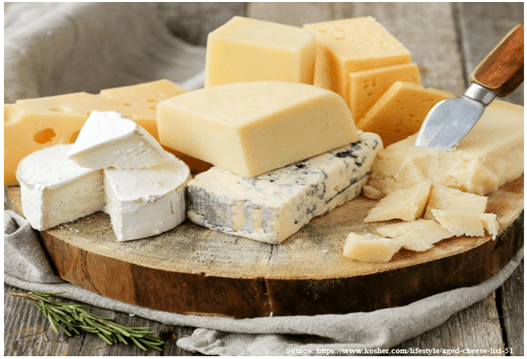
How to Eat It?
Cheese can be sprinkled on almost anything or eaten as an afternoon snack with nuts or fruit. When adding cheese to your diet, keep in mind that a tiny amount contains many calories and saturated fat.
4. Full-Fat Dairy
For those who can take it, pastured dairy is a fantastic choice for fertility and pregnancy. Dairy has a lot of saturated fat, which is good for fertility. Vitamins A, E, D, K, and K2 are among the fat-soluble vitamins found in them.
According to a study, females who consumed full-fat dairy products were less likely to have ovulation problems than those who tried low-fat dairy. Low-fat dairy products comprised skim or low-fat milk, yogurt, and cottage cheese in this investigation. Whole milk, cream cheese, ice cream, and other types of cheese were present in full-fat items.
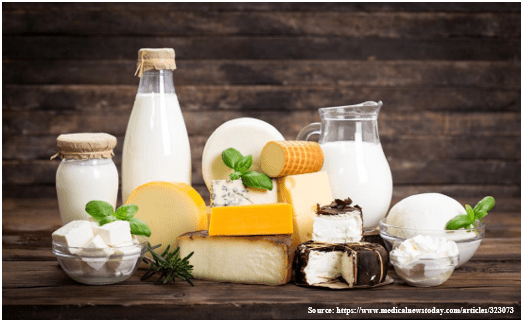
How to Eat It?
If you already consume dairy, switching to whole-fat products, such as skim milk for whole milk and low-fat yogurt for full-fat yogurt, is the simplest method to incorporate full-fat dairy into your diet.
A serving of full-fat ice cream now and again is also a lovely treat. Just remember to account for the extra calories. Limit yourself to one to two servings of ice cream per week if you want to indulge.
5. Liver
One of the most nutritious foods on the earth is the liver. Apart from being the best source of natural vitamin A, the liver is also rich in highly absorbable iron and Vit. B12. Iron can prevent miscarriage and maternal anaemia. Vit. B12 is essential for the proper formation of red blood cells and DNA.

How to Eat It?
You can go for the traditional simple liver and onions recipes.
6. Cooked Tomatoes
Tomatoes are abundant in lycopene, a potent antioxidant that can boost fertility. Lycopene’s potential effect in enhancing male fertility has been thoroughly researched.
Lycopene supplementation in men has been proven as an efficient treatment for male infertility. According to one study, supplementing with 4 to 8 mg of lycopene per day for 8 to 12 months improved sperm quality and increased conception rates.
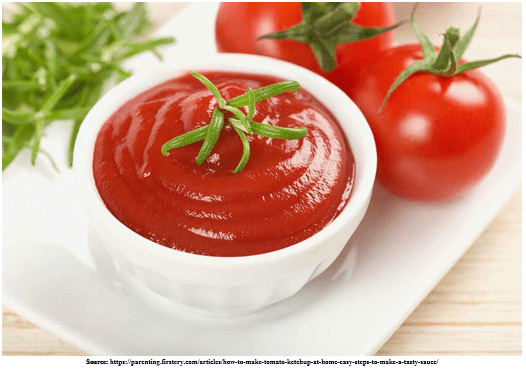
How to Eat It?
While both raw and cooked tomatoes include lycopene, cooked tomatoes have about twice the amount of lycopene as raw tomatoes. So, wherever possible, go for tomato soups, stews, tomato sauces, and other tomato-based dishes.
7. Beans and Lentils
Beans and lentils are high in fibre and folate. It is essential for maintaining a healthy hormonal balance. Lentils are also high in polyamine spermidine. It may improve the fertilizing capacity of sperm.
Lentils and beans are also high in protein which can improve ovulation. According to studies, consuming 5% of calories from vegetable protein rather than animal protein (mainly chicken and red meats) reduces the risk of infertility owing to anovulation by over 50%.
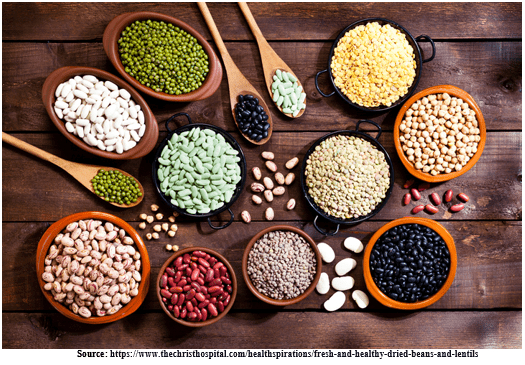
How to Eat It?
Consider substituting lentil or bean-based meals for one or two meat dinners. You can also substitute beans for cheese or meat in your salad.
If you go for a canned option, ensure the cans are BPA-free, a chemical that can lower oestrogen levels in women.
8. Asparagus
Asparagus is a highly nutrient-dense superfood. It is low in calories, filling, and provides a boost of vital reproductive nutrients.
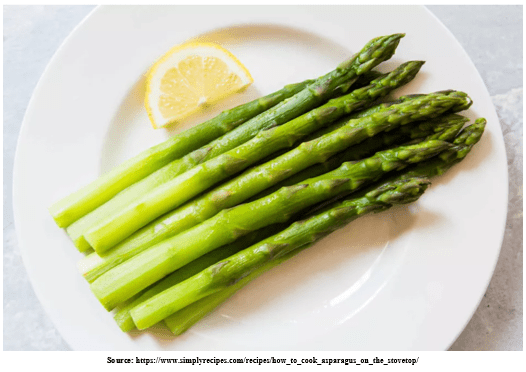
How to Eat It?
You should use fresh or frozen asparagus whenever possible. While canned asparagus is convenient, it is often high in sodium. If you prefer canned or jarred asparagus, seek low sodium choices and be sure to rinse it under running water before using it.
9. Oysters
Oysters can be seen on nearly every fertility food list. They have nutrients that help with fertility. Six raw oysters provide essential reproductive vitamins and minerals, including Vit. B12, zinc, selenium, and iron, in just 139 calories.
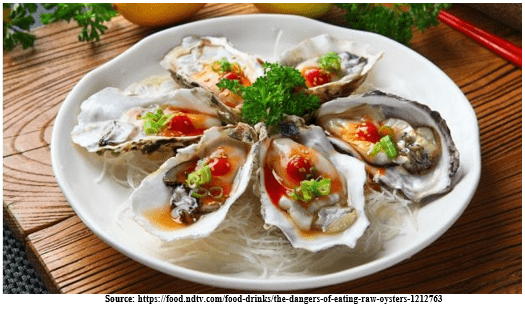
How to Eat It?
Oyster preparation can be intimidating for some individuals, but it doesn’t have to be. This recipe is easy to make and serve at home.
10. Pomegranate
Pomegranates have traditionally been linked to childbirth and fertility. They are high in antioxidants, which may help with sperm quality.
In a study, 70 men who didn’t have enough viable sperm count were given pomegranate fruit extract and galanga root powder tablets. Sperm motility rose by 62% after three months of treatment.

How to Eat It?
Pomegranate seeds are a delicious and healthy snack on their own. But they are also a great addition to yogurt, oats, salads, and quinoa bowls.
11. Walnuts
Omega-3 and omega-6 fatty acids are abundant in walnuts. It is one of the reasons why researchers wondered if they could help with fertility.
In a study, 117 men were divided into two groups: one who avoided walnuts and the other group who consumed 75 grams of walnuts every day. The males gave a semen sample before the experiment began and again after 12 weeks.
The group that ate walnuts exhibited improved sperm count, motility, and shape after 12 weeks. Also, they noticed fewer chromosomal abnormalities in the sperm samples.
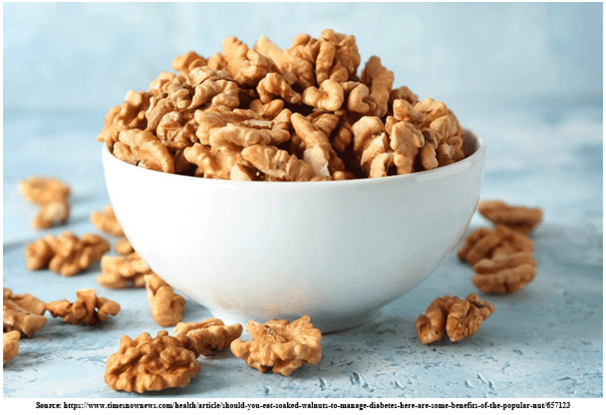
How to Eat It?
A handful of walnuts is a delicious afternoon snack. For a nutrient boost, add walnuts to chicken salad, cereal, or even a scoop of ice cream.
12. Egg Yolks
Vit. A, iron, calcium, zinc, Vit. B6, folate, and Vit. B12 are all found in egg yolks. In addition to the fertility promoting omega-3 fatty acids EPA and DHA, pasture-raised chicken egg yolks are also rich in fat-soluble vitamins like A, D, E, and K2.
Eggs are a low-cost source of the lean protein linked to improved fertility in both men and women. Choline is also present in eggs. It can reduce the risk of specific congenital abnormalities.
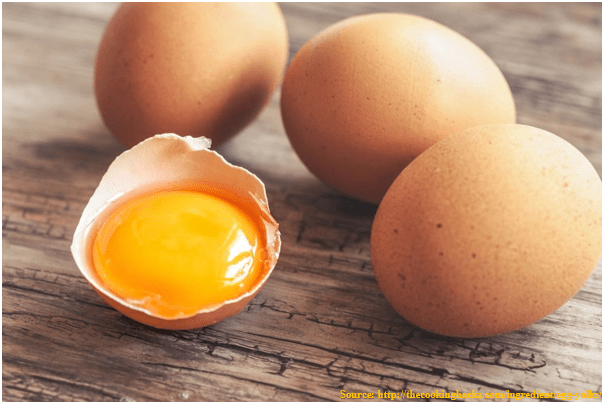
How to Eat It?
Hard-boiled, scrambled, poached, or fried eggs are all options.
13. Pineapple
The Vit. C content of pineapple is higher. Vit. C deficiency has been linked to polycystic ovarian syndrome (PCOS). PCOS can lead to persistent inflammation, which can inhibit ovulation.
Bromelain, a natural enzyme found in pineapples, has anti-inflammatory and anticoagulant (blood-thinning) properties. Besides, bromelain stimulates the immune system to leave the inflammatory state behind.
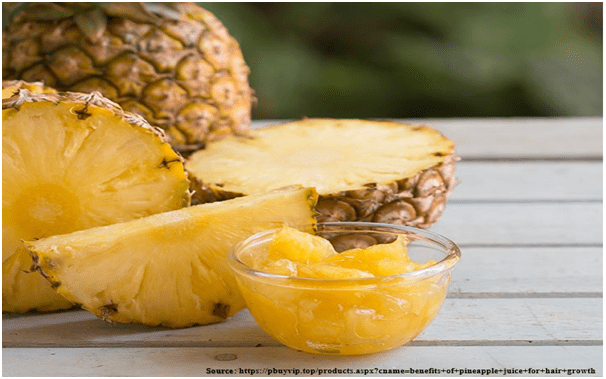
How to Eat It?
This tropical fruit can naturally fulfil your sweet tooth. Fresh pineapple is preferable to canned pineapple. The heat used in canning destroys much of the bromelain in canned pineapple. It is delicious on its own or in a salad.
14. Salmon
Salmon appears on nearly every superfood list, fertility-related or not. There is a reason for that. Salmon is high in essential fatty acids and omega-3 fatty acids, suitable for men’s and women’s fertility. It is also rich in selenium and Vit. D. Selenium is a mineral necessary for sperm health. Vit. D deficiency has been linked to infertility in women and men.

How to Eat It?
When it comes to mercury levels in fish, you should be cautious when attempting to conceive and during pregnancy. When possible, buy wild-caught salmon instead of farm-raised to prevent mercury poisoning, antibiotics, and hazardous food dyes.
15. Cinnamon
In women with polycystic ovary syndrome (PCOS), a prominent cause of female infertility, cinnamon supplements can help regulate irregular menstruation cycles.
In a study, women with PCOS who took a daily cinnamon supplement had nearly twice as many menstrual cycles as those who didn’t take it. More regular ovulatory cycles mean more chances to conceive.
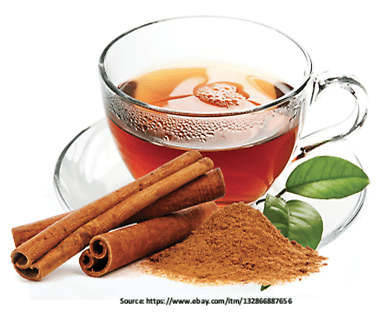
How to Eat It?
Cinnamon can be sprinkled on porridge, yogurt, tea, or coffee. You can also use the spice as a supplement. But talk to your doctor before taking any new supplement.
If you face any issues in conceiving, don’t wait; plan a consultation with an experienced fertility specialist in Ahmedabad to avail the most effective fertility treatment.

